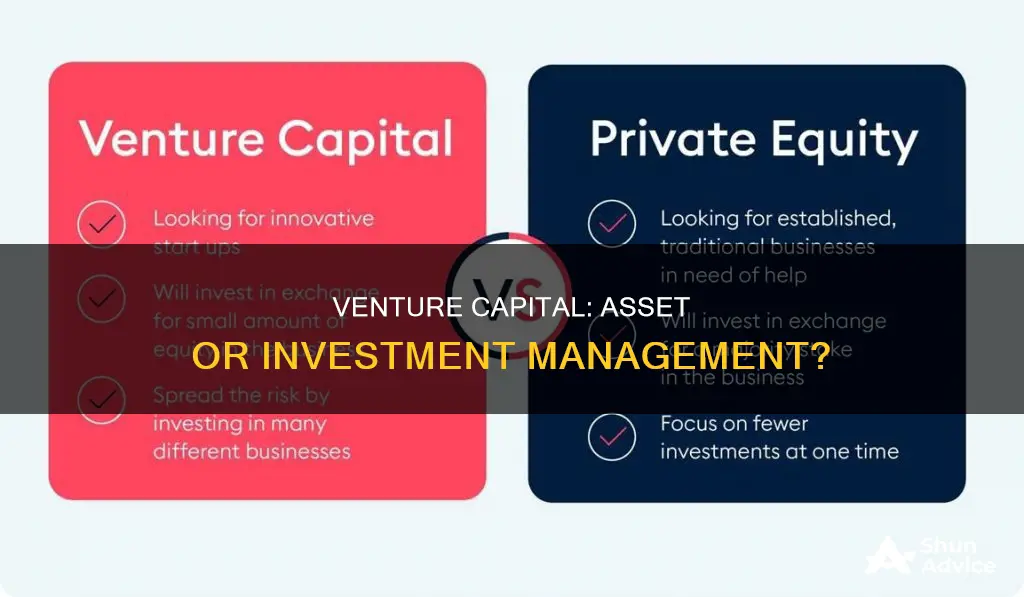
Venture capital (VC) and asset or investment management are two different types of professional finance companies. Venture capital is a type of private equity and a form of financing for startup companies and small businesses with long-term growth potential. VC firms invest in dozens of startups and accept that some of their investments will fail, while a few will have outsized success. On the other hand, investment management, such as investment banking, assists companies in raising investment capital and can act as intermediaries in financial transactions. Investment banks earn profits by charging fees for their services, while venture capitalists rely on returns from their investments. While VC firms focus on high-potential startups, investment banks typically work with established firms.
| Characteristics | Values |
|---|---|
| Investment type | Venture capital is a type of private equity |
| Investment stage | Venture capital invests in startups and early-stage companies; private equity invests in mid-stage or mature companies |
| Risk | Venture capital investments are high-risk, high-reward; private equity investments are lower-risk, lower-reward |
| Returns | Venture capital relies on a few "home runs" to offset losses; private equity generates consistent returns |
| Investment strategy | Venture capital focuses on diversification and rapid prototyping; private equity focuses on controlling portfolio companies and increasing revenue |
| Investment size | Venture capital investments are typically smaller ($10 million or less); private equity investments are typically larger ($100 million or more) |
| Investment focus | Venture capital often focuses on technology, biotechnology, and clean technology; private equity invests in companies from any industry |
| Investor type | Venture capital investors include wealthy individuals, investment banks, and specialized VC funds; private equity investors include large institutional investors and high-net-worth individuals |
| Investment form | Venture capital can be financial, technical, or managerial; private equity is typically financial |
What You'll Learn

Venture capital is a type of private equity
Venture capital and investment management are distinct but related concepts in finance. Venture capital (VC) is indeed a type of private equity, and it involves investing in startups and early-stage companies with high growth potential.
VC firms provide funding, usually in the form of equity investments, to new or fast-growing businesses that show potential for significant returns but also carry a high risk of loss. These startups often need substantial amounts of capital to scale their operations and VC firms fill this gap by taking equity stakes in these companies.
VC investors accept that some of their investments will fail, but they aim for a few of them to be very successful, generating enough profits to offset the losses. VC firms often take board seats in the companies they invest in, exerting influence over their operations.
VC is a subset of private equity, which involves investing in private companies or those not publicly traded on stock exchanges. Private equity firms may buy companies or gain controlling stakes in them, aiming to increase their value and sell them for a profit.
While related, venture capital and private equity differ in several ways. Private equity firms typically invest in mid-stage or mature companies, while VC firms focus on early-stage startups. Private equity investments are generally larger, as they often seek controlling ownership, whereas VC firms tend to spread their investments across multiple companies to manage risk. Private equity firms use both debt and equity for investments, while VC firms primarily use equity.
Savings Strategies: Maximizing Output from Your Investments
You may want to see also

VCs invest in startups and early-stage companies
Venture capital (VC) firms invest in startups and early-stage companies, providing them with financial support and strategic guidance they need to grow and succeed. These investments are typically made using funds from investment banks, private investors, and private equity firms.
VC firms play a crucial role in helping startups bridge the gap between a proven idea and scaling their business. They take on the risk of investing in companies that are not yet large enough to access global capital markets but require significant capital to expand. By taking equity stakes in these companies, VC firms accept the potential for substantial returns, as well as a high risk of loss.
The main goal of a VC firm is to identify promising startups with high growth potential. They provide financial support, mentorship, and access to networks to help these startups succeed. VC firms may specialize in specific industries, such as tech, AI, healthcare, or clean energy, or focus on particular stages of investment, geographical regions, or types of startups.
Securing funding for early-stage startups can be challenging due to the high risk involved. Startups must demonstrate their credibility, viability, and long-term growth potential to convince VC firms to invest. Early-stage companies often go through several funding rounds, starting with pre-seed and seed funding, followed by series A financing as they show promising growth and achieve milestones.
Overall, VC firms play a vital role in supporting innovative startups and driving industry evolution by providing the necessary capital, guidance, and connections to help them thrive.
SSS Workers Investment and Savings: A Guide to the Program
You may want to see also

VCs provide financial and strategic support
Venture capital (VC) is a type of investment capital where the VC firm invests in a new or fast-growing business or startup with high growth potential but also a high risk of loss. Startups are usually based on an innovative technology or business model and are often from high-technology industries, such as information technology, clean technology, or biotechnology.
VCs provide financial support by investing in these early-stage companies, typically by taking equity stakes. They accept that some of their investments will fail and lose their capital, but they hope that the few successes will more than make up for these losses.
VCs also provide strategic support by offering mentorship and access to their networks and industry connections. They often take board seats at the company and exert significant influence on how the business operates. They may also provide strategic advice to the company's executives on its business model, marketing strategies, and operational decisions.
VCs play a crucial role in helping startups bridge the gap between the initial idea and scaling the business. They identify promising startups, invest in them, and provide the financial and strategic support needed to grow and succeed.
The All-Weather Portfolio: A Guide to Investing for Stability
You may want to see also

VCs invest in diverse sectors
Venture capital (VC) is a type of investment capital where VC firms invest in new, fast-growing, or small businesses with high growth potential but also a high risk of loss. These businesses are usually start-ups that are not yet large enough to access the global capital markets available to large, established corporations.
VCs make many different, relatively small investments with the hope that a few will have outsized success. They accept that some of their investments will fail and lose their capital. However, they expect that the few successful investments will offset those losses with enough left over for significant profits.
- Technology, including the internet, healthcare, computer hardware and services, mobile and telecommunications, and software
- Life sciences or biotechnology
- Clean energy
- Artificial intelligence (AI)
- Healthcare
- Financial services
- Consumer products
- Biotech
- Clean technology
VCs also invest in companies at different stages of development, including:
- Pre-seed
- Seed
- Early-stage
- Growth
- Late-stage
Investing Wisely: Choosing the Right Portfolio for You
You may want to see also

VCs have a higher risk appetite
Venture capital (VC) firms have a higher risk appetite than asset or investment management firms. This is because VC firms invest in new, fast-growing businesses or startups that have significant return potential but also a high risk of loss.
VC firms fill the gap between proven ideas and scaling by typically taking equity stakes in startups. They make many different, relatively small investments, knowing that some will fail, but hoping that a few will have outsized success. This is a high-risk, high-reward strategy.
VC firms accept that some of their investments will lose their capital, but they expect that the few successes will more than make up for these losses. Due to the high risk of investing in startups, VC firms often take board seats and exert significant influence on the company's operations.
VC firms have a higher risk appetite than asset or investment management firms, which tend to work with more established firms that have access to broader capital markets. VC firms specialize in helping early-stage companies secure funding, whereas asset or investment management firms are intermediaries that assist companies in raising capital through various means, such as initial public offerings or mergers and acquisitions.
Savings, Investment, Employment, and GDP: A Balancing Act
You may want to see also
Frequently asked questions
Venture capital is a type of investment capital where the venture capital firm invests in a new or fast-growing business or start-up that has the potential for significant returns, but also a high risk of loss.
Asset management is a form of investment management where financial services firms manage investment portfolios for their clients.
Venture capital firms invest in dozens of startups, knowing that only a few will yield returns. They tend to invest in 50% or less of the equity of the companies they back.
Venture capital firms tend to invest in high-risk, high-growth startups, whereas asset management firms invest in a wider range of companies, including more mature businesses.
Both venture capital and asset management involve investing in companies to generate returns. They both also often involve investing in private companies.







